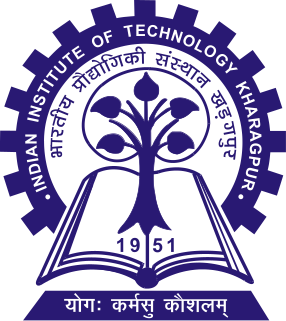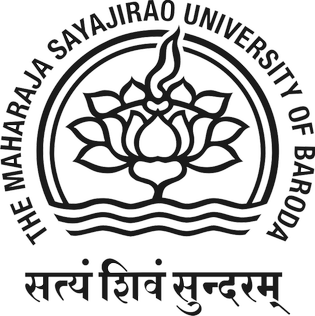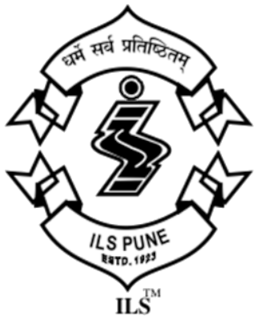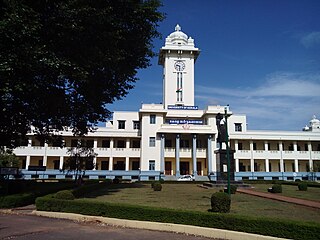Related Research Articles

Indian Institute of Technology Kharagpur is a public research university established by the Government of India in Kharagpur, West Bengal, India. Established in 1951, the institute is the first of the IITs to be established and is recognised as an Institute of National Importance. In 2019 it was awarded the status of Institute of Eminence by the Government of India.

Indian Institute of Technology Roorkee is a technical university located in Roorkee, Uttarakhand, India.

The Maharaja Sayajirao University of Baroda, formerly Baroda College, is a public university in the city of Vadodara, in Gujarat state, India. Originally established as a college in 1881, it became a university in 1949 after the independence of the country. It was later renamed after its benefactor Maharaja Sayajirao Gaekwad III, the former ruler of Baroda State.

Banaras Hindu Universitylisten (help·info) (BHU) (Hindi: काशी हिन्दू विश्वविद्यालय IAST:kashi Hindu vishwavidyalayaIPA: kaʃi hind̪u viʃvəvid̪yaləy), formerly Central Hindu College, is a collegiate, central, and research university located in Varanasi, Uttar Pradesh, India. It was established in 1916 jointly by Pandit Madan Mohan Malaviya, the Maharaja of Darbhanga Rameshwar Singh, Maharaja of Banaras Prabhu Narayan Singh, Sunder Lal and British Theosophist and Home Rule League founder Annie Besant. With over 30,000 students, and 18,000 residing on campus, BHU is the largest residential university in Asia. The university is one of the eight public institutions declared as an Institute of Eminence by the Government of India.

The West Bengal National University of Juridical Sciences is a premier public law school in India, also known as Columbia of East, and is an elite National Law University located in Bidhannagar, Kolkata, West Bengal, India. In 2021, it was ranked fourth among law colleges in India by National Institutional Ranking Framework and second by India Today. It comes under the exclusive chancellorship and purview of the Chief Justice of India.

Calyampudi Radhakrishna Rao FRS, commonly known as C. R. Rao, is an Indian-American mathematician and statistician. He is currently professor emeritus at Pennsylvania State University and Research Professor at the University at Buffalo. Rao has been honoured by numerous colloquia, honorary degrees, and festschrifts and was awarded the US National Medal of Science in 2002. The American Statistical Association has described him as "a living legend whose work has influenced not just statistics, but has had far reaching implications for fields as varied as economics, genetics, anthropology, geology, national planning, demography, biometry, and medicine." The Times of India listed Rao as one of the top 10 Indian scientists of all time. Rao is also a Senior Policy and Statistics advisor for the Indian Heart Association non-profit focused on raising South Asian cardiovascular disease awareness.

Indian Statistical Institute (ISI) is a higher education and research institute which is recognized as an Institute of National Importance by the 1959 act of the Indian parliament. It grew out of the Statistical Laboratory set up by Prasanta Chandra Mahalanobis in Presidency College, Kolkata. Established in 1931, this unique institution of India is one of the oldest institutions focused on statistics, and its early reputation led it to being adopted as a model for the first US institute of statistics set up at the Research Triangle, North Carolina by Gertrude Mary Cox.

The Indian Institute of Foreign Trade (IIFT) is a leading business school of India. Established in 1963, it works as an autonomous body under the Ministry of Commerce & Industry, Government of India. It also functions as a civil services training institute. Its main campus is in New Delhi and new campuses are in Kolkata and Kakinada.

Symbiosis Law School (SLS) is a law school with campuses located in Pune, Hyderabad, and Nagpur in India. The law school was established in 1977 under the banner of Symbiosis Society, under the patronage of S. B. Mujumdar, President and Founder Director. It is registered under the Societies Registration Act, 1860 and the Bombay Public Trust, Act, 1950. Symbiosis Law School is a constituent college of the Symbiosis International University.

Kalinga Institute of Industrial Technology (KIIT), formerly KIIT University, is a private deemed university located in Bhubaneswar, Odisha, India. It primarily emphasizes on higher education and research in engineering and science. It offers 34 undergraduate, 32 postgraduate, 10 integrated, 11 Ph.D and 7 postdoctoral research programmes in the fields of science and engineering, medical science, management, law, film and media, humanities and yoga and sports. The admissions for B.Tech. programmes are purely based on merit as per the results in KIITEE exam.
V. S. Mani was an Indian legal scholar. He was the founder and director of Gujarat National Law University and an expert in the field of public international law. He was also the founder and director of the Seedling School of Law and Governance at Jaipur National University in Rajasthan, India. He died on 22 August 2016.

ILS Law College, or in its full name Indian Law Society's Law College, is a government-aided law school in Pune, India. It was established in 1924 and offers courses that include three-year and five-year degrees. ILS is located on Law College Road, Pune. The college was aided by The Ford Foundation.

The importance and antiquity of education in Kerala are underscored by the state's ranking as among the most literate in the country. The educational transformation of Kerala was triggered by the efforts of the Church Mission Society missionaries, who were the pioneers that promoted mass education in Kerala, in the early decades of the 19th century. The local dynastic precursors of modern-day Kerala—primarily the Travancore Royal Family, the Nair Service Society, Sree Narayana Dharma Paripalana Yogam and Muslim Educational Society (MES)—also made significant contribution to the progress on education in Kerala. Local schools were known by the general word kalaris, some of which taught martial arts, but other village schools run by Ezhuthachans were for imparting general education. Christian missionaries and British rule brought the modern school education system to Kerala. Ezhuthu palli was the name used in earlier times. The word was derived from the schools run by the Buddhist monastries. For centuried villages used to setup an ezhuthupally or ashan pallikoodam with one or two teachers. Students used to go this school from nearby areas and learn languages, literature, mathematics, grammer etc. After completing this students may continue study about specific subjects such as ayurveda, astrology, accounting etc. Censuses during 1800 shows that Travancore, Cochin, Kannur areas have many such schools. Even name list of ashans were used to be published along with the census.

Indian Institute of Science Education and Research, Mohali is an autonomous public university established in 2007 at Mohali, Punjab, India. It is one of the seven Indian Institutes of Science Education and Research (IISERs), established by the Ministry of Human Resources and Development, Government of India, to research in frontier areas of science and to provide science education at the undergraduate and postgraduate level. It was established after IISER Pune and IISER Kolkata and is recognised as an Institute of National Importance by the Government of India. It promote research in various fields of science.

The Indian Law Institute (ILI) is a Deemed University and socio-legal research institute, founded in 1956. Established in New Delhi, primarily with the objective of promoting and conducting legal research, education and training. The objectives of the Institute as laid down in its Memorandum of Association are to cultivate the science of law, to promote advanced studies and research in law so as to meet the social, economic and other needs of the Indian people, to promote systematization of law, to encourage and conduct investigations in legal and allied fields, to improve legal education, to impart instructions in law, and to publish studies, books, periodicals, etc.

Prem Chand Pandey is an Indian space scientist, planetary scientist, and academic in the fields of satellite oceanography, remote sensing, atmospheric science, the Antarctic and climate change, and also he is the founding director of the National Centre for Polar and Ocean Research (NCPOR).

B C Nirmal born 19 February 1952, is an Indian Professor of Law specialised in International law, Human rights. He is Vice Chancellor at National University of Study and Research in Law, Ranchi, Jharkhand. Till recently, he was Head and Dean of Law School, Banaras Hindu University (Varanasi). He has also been the Vice-President of Indian Society of International Law, Vice President of All India Law Teachers Congress, Member of Executive Council, Indian Society of International Law, New Delhi and Member of Governing Council of Indian Law Institute, New Delhi. He is also a Member of the Academic Council of Banaras Hindu University, Varanasi, Deen Dayal University, Gorakhpur. Before he took on the post of Vice Chancellor he was a member of the Academic Council and Professor of the Gujarat National Law University, Gujarat.
Pacific University (formally known as "Pacific Academy Of Higher Education And Research University" is a private university in Udaipur, Rajasthan, India. It was established in 2010 by the PAHER Society. In April 2014 it was granted provisional membership by the Association of Indian Universities. Recently the university has been granted UGC approval for its operations u/s 22 and 2f of UGC act 1956.
Erode Subramanian Raja Gopal was an Indian condensed matter physicist, a former professor at the Indian Institute of Science and a former director of the National Physical Laboratory of India. Known for his research in condensed matter physics, Raja Gopal was an elected fellow of all the three major Indian science academies – the Indian National Science Academy, the National Academy of Sciences, India, and the Indian Academy of Sciences – as well as a member of the Institute of Physics. He was a former CSIR emeritus scientist, an alumnus of the University of Oxford and the author of three reference texts in condensed matter physics. The Council of Scientific and Industrial Research, the apex agency of the Government of India for scientific research, awarded him the Shanti Swarup Bhatnagar Prize for Science and Technology, one of the highest Indian science awards, for his contributions to Physical Sciences in 1978.
Muthusamy Lakshmanan is an Indian theoretical physicist currently working as Professor of Eminence at the Department of Nonlinear Dynamics of Bharathidasan University. Presently he is the DST-SERB National Science Chair awarded by Science and Engineering Research Board, Department of Science and Technology. He has held several research fellowships which included Raja Rammanna fellowship of Department of Atomic Energy, Alexander von Humboldt fellowship, Japan Society for the Promotion of Science fellowship, Royal Society Nuffield Foundation fellowship, and NASI-Senior Scientist Platinum Jubilee Fellowship. In the year 2021, on August 15, he was conferred with Dr. A. P. J Abdul Kalam Award by the Government of Tamil Nadu.
References
- ↑ Patel, Bimal N. (2008). India and international law, Volume 2. Martinus Nijhoff Publishers. p. 8. ISBN 978-90-04-16152-8.
- ↑ "The Indian Society of International Law". Archived from the original on 14 November 2011. Retrieved 22 November 2011.
- 1 2 3 Finch, Eleanor H. (1960). "The Indian Society of International Law". American Journal of International Law. 54 (3): 630–631.